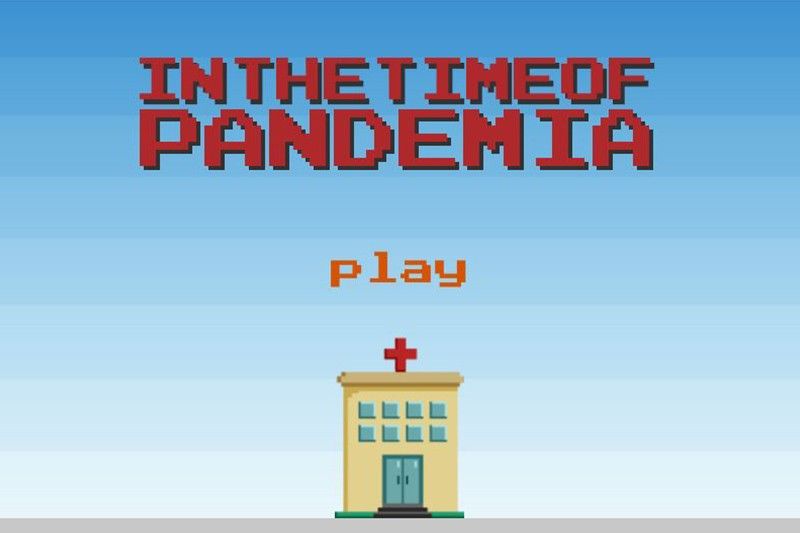Pinoy-made game simulates nightmare of COVID-19 management

MANILA, Philippines — Think you could have managed the local COVID-19 outbreak better? A free-to-play online game developed by a Pinoy-led team helps players find out by putting them in charge of a community threatened by the coronavirus.
“In The Time of Pandemia (ITOP),” it becomes their job to save lives by testing and isolating citizens while managing scarce hospital resources and opting to place the community under lockdown.
Of course, the population can always say “No!” to health protocols and carry on partying and spreading the virus.
"Six months before the release of a vaccine, the pandemic threatens to engulf your hometown," read the game's opening text.
From there, a nightmare unfolds as the player attempts to contain the crisis in real-time.
I launched this game quietly 48 hours ago as I was unsure of my bearings in this genre... It got featured and is today's...
Posted by Khail Santia on Sunday, August 2, 2020
Endgame
Townsfolk are each generated with different names, ages and even chances of having a comorbid condition.
Each member of the population ranges from healthy, asymptomatic but contagious, symptomatic, severe, critical, dead and recovered. They all move around and risk infecting others.
The player, who works as a crisis manager, can buy and use test kits, isolate and hospitalize townsfolk, and enforce a lockdown at the cost of not generating much-needed money.
Although the game ends when the vaccines arrive, the player can win earlier if there are no more infections without having to wait for vaccines — a nod to countries with best practices.
Appeal
Lead developer Khail Santia of virtual indie game development studio Moocho Brain told Philstar.com in an online exchange that user feedback to ITOP has been active and positive.
“Our content analysis of player comments show that the top three themes are the following (1) a positive general assessment of the game; followed by (2) some form of cognitive response such as players saying the game made them realize how non-compliant people make stopping the pandemic much harder; and (3) an appreciation of the game's realism—players seeing their personal experiences reflected in the game,” he said.
Khail had entered game development years ago with the goal of changing the educational system — “to help make the joy of learning fundamental to how we teach and learn.”
“I started making entertainment games because one of the gaps we observed in the field of educational game was, still is, a lack of experienced entertainment game designers. We believe this is one reason why many ‘educational games’ end up as Shavian reversals – neither fun nor educational,” he said.
ITOP is considerably popular for an educational game, having been accessed over 16,000 times on online entertainment portal Newgrounds.
The game's appeal lies in its simple interface and charming aesthetic reminiscent of fifth-generation video games.
But don’t let the surface fool you: the mechanics are fairly complicated to simulate the real-life difficulty of a situation not completely under your control.
SOS
The game also includes an "SOS" feature to promote several causes. Clicking the "SOS" tab in the main menu leads you to a screen asking, "Please extend whatever help you can to communities most in need."
This includes external links that allow players to sponsor meals for COVID-19 patients and frontliners in Cebu City's Barrio Luz and food packs for indigenous families in Barangay Mambaling, as well as support for outbreak mitigation in Cebu City Jail and other underprivileged communities.
“Our data indicate that about 1% of the players clicked these links. We are yet to confirm if funds were indeed transferred,” the Cebu City-based game developer said.
Real-world application
Beyond the in-game support to different advocacy programs, ITOP in itself serves as an example of the real-world application of video games.
“[W]e have documented player feedback that indicates ITOP is able to make COVID-19 data come alive for the players,” Khail said.
He gave as reference a Mexican artist “who implied that the game taught him to empathize with the plight of the disadvantaged in this pandemic: how he was moved by the sight of some people having no choice but to risk exposure to make ends meet or needing treatment but couldn't afford any.”
What personally attracted the creative to the field of applied game design is its “potential to revolutionize communication.”
“Games complement, go beyond the vicarious learning of traditional media to put players in the center of action, to offer a more direct experience, to take learning by doing to a massive scale. ITOP has perhaps given me a little more confidence that this revolution might be more than just a product of theoretical enthusiasm.”



















